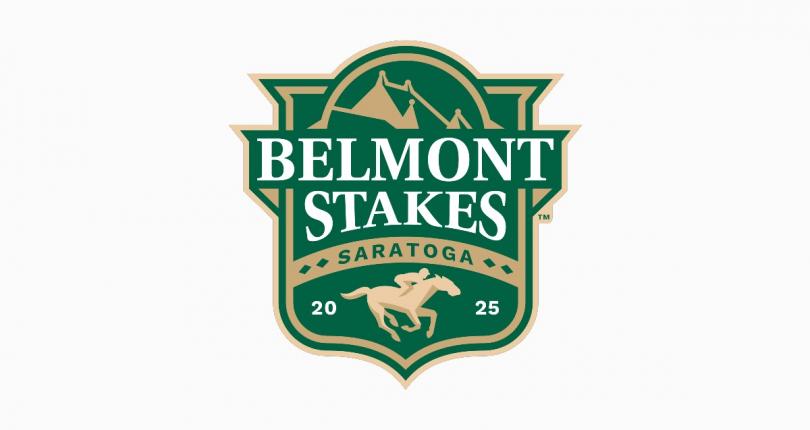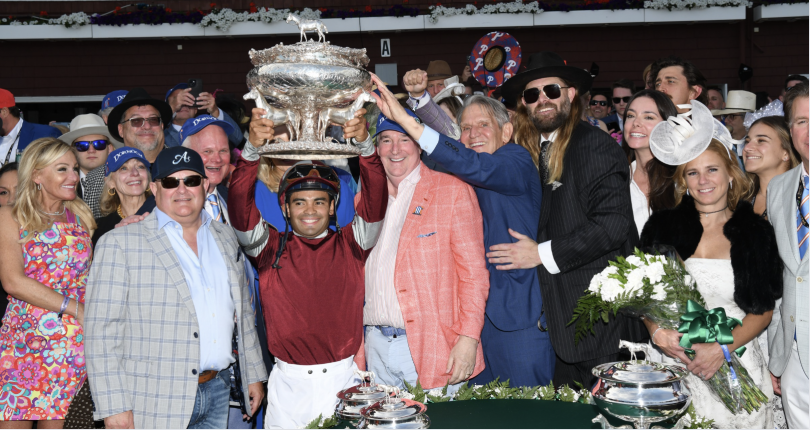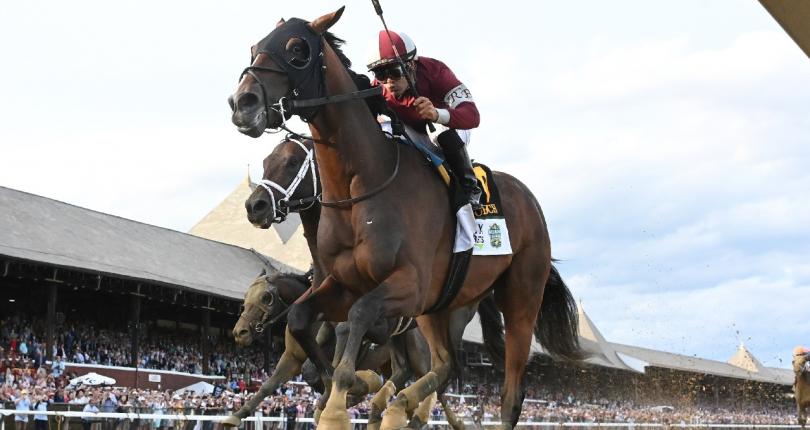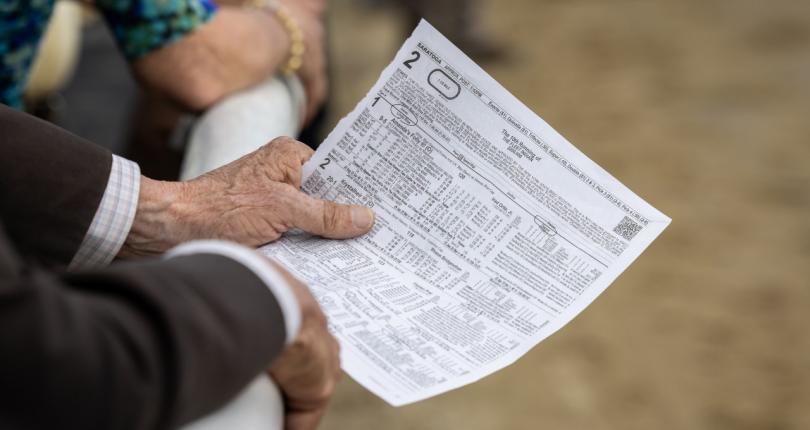
Man o' War Stakes pays homage to an all-time great
by Brian Bohl
Paid banners below are not related to Belmont Stakes Ticket Sales.
Author Tom Wolfe once said of the Empire State: "One belongs to New York instantly, one belongs to it as much in five minutes as in five years." Man o' War's total racing career wasn't much longer than those five minutes. But his legacy, built on historic success across four New York tracks, made him an indelible part of the state's sporting landscape as much as any other athlete, equine or human.
The Hall of Famer, who was born 102 years ago before embarking on one of the most successful thoroughbred careers of all time, raced a grand total of approximately 27 minutes, 54.5 seconds total in his 18 races in New York spanning Belmont Park, Saratoga Race Course, Aqueduct Racetrack and the now-defunct Jamaica Racetrack. He won 17 of them, with his only career loss coming in a second-place finish when the aptly named Upset won the 1919 Sanford Memorial by a half-length at Saratoga after a difficult start.
Man o' War, with 20 wins in 21 career starts, earned a place in the conversation as the best thoroughbred ever, with polls by both Blood Horse magazine and the Associated Press ranking him the best of the century in their respective polls in 1999. In his time, he was as big of a superstar as Babe Ruth or Jack Dempsey, with overflow crowds of more than 35,000 greeting him for the Miller Stakes in the summer of 1920 at Saratoga.
When Man o' War died in November 1947 at the age of 30, the New York Times said in its obituary: "No other horse ever won such fame as Man o' War. None was more beautiful, with lovelier lines of grace and power. None was more beloved by an admiring and faithful public. Few have lived so long. The American scene seems a little vacant with Man o' War gone to the Elysian Fields where all good horses go."
Man o' War earned his inevitable induction into the National Museum of Racing Hall of Fame in 1957, and two years later, a race was named in his honor. Though the all-time great nicknamed "Big Red" never raced on turf in his career, one of the New York Racing Association's most prestigious grass races bears his namesake, with the 61st running of the Grade 1, $700,000 Man o' War on the inner turf headlining a Belmont Saturday featuring five total stakes on May 11 as part of the Man o' War Racing Festival.
Hall of Fame inductees inundate the stakes history page of the Man o' War, which has been contested at its current 1 3/8-mile distance since 1978. When it was contested at 1 ½ miles, three inductees won it in a four-year stretch, with Fort Marcy capturing the 1970 edition. Fittingly, another horse whose acclaim came from immortal races on dirt won the Man o' War, with Secretariat, just four months after dazzling the Belmont Park crowd with a Triple Crown-clinching romp in the Belmont Stakes, winning his first career turf race at the same park with a five-length win in 2:24.80 on October 8, 1973; the fastest Man o' War-time ever for the distance. The next year, future Hall of Famer Dahila earned a trip to the winner's circle.
The Man o' War has seen top turf horses vie for supremacy at both Aqueduct and Belmont, with the Big A launching the stakes and hosting it in 1961, as well as 1963-67 during Belmont's renovations and for the last time in 1987, when it was contested on October 24 and the duo of Pat Day and trainer Bill Mott teamed to lead Theatrical to glory.
One of just 36 TOBA Grade 1 turf races on the North American racing calendar for 2019, the Man o' War is also the first Grade 1 of the 48-day Belmont spring/summer meet. Previously part of the fall meet with either a September or early October date, NYRA moved the race to July in 2008. The next year, Gio Ponti won the first of two consecutive Man o' Wars, making him just the fourth horse to repeat in the race and the last to do so.
"He competed at the top level and had a great turn-of-foot," said trainer Christophe Clement, who saw Gio Ponti win as the favorite both times, besting a nine-horse field to win by 1 ¾ lengths in 2009 and edging Mission Approved by a neck the next year. "When you combine his skills, he was really special. He won the Man o' War at a mile and three eighths and the [2011] Shadwell Mile.
"It's a major race. It used to be in the fall and lead into the Breeders' Cup. It's a real popular race. I wish I had a horse to compete it in now. I'd love to be back in it and I'll work as hard as I can to find one. It's a tough race, it's at Belmont Park. You don't have easy Grade 1s in New York. It doesn't exist."
Some of the best jockeys on the New York circuit have piloted their horses to a Man o' War win, with 20 Hall of Fame riders in total having their photo taken. In 39 of the previous 61 iterations, with the inaugural edition being run in two divisions in 1959, a jockey who was eventually enshrined was in the irons for the winner.
The selective group includes luminaries such as Day, Bill Shoemaker, Bill Hartack, Ron Turcotte, Eddie Maple, Gary Stevens, Angel Cordero, Jr. and Jorge Velasquez, who has the stakes-record five wins. John Velazquez, North America's all-time leader in jockey earnings, has been aboard for three Man o' War winners in the last six years, including Wake Forest in 2016 and Zhukova in 2017.
"It's the kind of race you like to be in; to be fortunate enough to ride nice horses and to win it, it's special," said Velazquez, who rode his first Man o' War winner with the Shug McGaughey-trained Boisterous in 2013. "These are the kind of races that hook you and keep you coming back. You want to keep winning more."
Also on that Hall of Fame list is Julie Krone, the first female jockey to win a Triple Crown race when she led Colonial Affair to the 1993 Belmont Stakes win. Krone, a native of Benton Harbor, Michigan, remains the only woman to win the Man o' War when she guided post-time favorite Royal Mountain Inn to a half-length win over Flag Down in September 1994.
Barclay Tagg, who trained Royal Mountain Inn, said there was plans for another future Hall of Famer, Mike Smith, to have the mount in the Man o' War, but Krone, who had defeated Smith and Spectacular Tide in the Grade 2 Red Smith a year earlier on Belmont's inner turf, got the return call.
"His agent took him off at the last minute and I was able to get Julie back on the horse then, and they came flying down the stretch and beat that horse by half a length, it was very satisfying," said Tagg, who will look to saddle an entrant in this year's race with Highland Sky.
In 2014, the race was moved to May, where it now anchors a stakes-filled card that includes the Grade 3, $300,000 Peter Pan, the traditional Belmont Stakes prep for 3-year-olds, as well as the Grade 3, $200,000 Beaugay for older fillies and mares on the turf; the Grade 3, $200,000 Vagrancy for older fillies and mares going 6 ½ furlongs on the main track; and the $150,000 Runhappy for 4-year-olds and up going six furlongs.
"It doesn't make much of a difference to us. It depends on the horses and the preparation, but we're just ready to race," Velazquez said.
Man o' War, whose stride was thought to be from 25-to-28 feet, was one of more than 1,600 thoroughbreds foaled in 1917. He became one of the most famous animals who ever lived, thanks in part to his dominating performances on New York tracks, including a 20-length win in the Belmont Stakes. But he also proved his greatness in multiple countries, including his career finale in Canada when the 3-year-old bested the 4-year-old Sir Barton - retroactively credited with history's first career Triple Crown victory in 1919 - by seven lengths in a match race on October 12, 1920 at Kenilworth Park in Windsor, Ontario. Man o' War's win in the 1920 Travers set a track record that took 42 years to break.
"Man o' War did not beat, he merely annihilated," wrote legendary turf writer Joe Palmer. "He did not run to world records, he galloped to them. He was so far superior to his contemporaries that, except for one race against John P. Grier [beaten by Man o' War in Dwyer], they could not extend him. In 1920 he dominated racing as perhaps no athlete - not Tilden or Jones or Dempsey or Louis or Nurmi or Thorpe or any human athlete - had dominated his sport."








 Gambling Problems? The New York Racing Association encourages responsible wagering. If gambling is a problem for you or someone you care about, help is available 24 hours a day. Scan here to talk with someone now about your gambling. Or call toll-free 1-877-8-HOPE-NY.
Gambling Problems? The New York Racing Association encourages responsible wagering. If gambling is a problem for you or someone you care about, help is available 24 hours a day. Scan here to talk with someone now about your gambling. Or call toll-free 1-877-8-HOPE-NY.